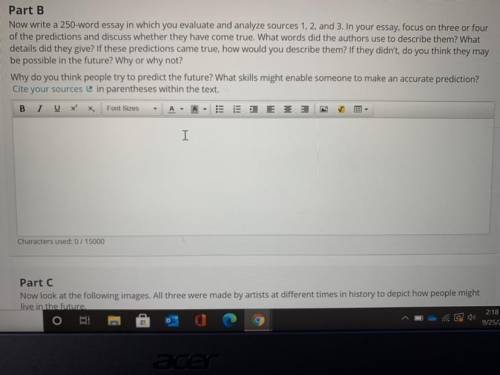
Social Studies, 06.10.2020 18:01 ahnorthcutt4965
Read these excerpts from three primary sources:
Source 1
This view of the future comes from John Wilkins (1614–1672), an English clergyman, naturalist, and writer, who helped
found the Royal Society for Natural Knowledge in England:
Yet I do seriously and on good grounds affirm it possible to make a flying chariot in which a man may sit and give such
a motion unto it as shall convey him through the air. And this perhaps might be made large enough to carry diverse
men at the same time, together with food for their viaticum and commodities for traffic. It is not the bigness of
anything in this kind that can hinder its motion, if the motive faculty be answerable thereunto. We see a great ship
swims as well as a small cork, and an eagle flies in the air as well as a little gnat.
Source: John Wilkins from A Discourse Concerning a New World and Another Planet, book 1, 1640
Source 2
Nikola Tesla (1856-1943) was a Serbian American inventor, scientist, engineer, and entrepreneur who worked with
electricity and contributed to the development of alternating current. He made these predictions about the future:
It will soon be possible, for instance, for a business man in New York to dictate instructions and have them appear
instantly in London or elsewhere. He will be able to call up from his desk and talk with any telephone subscriber in the
world. It will only be necessary to carry an inexpensive instrument not bigger than a watch, which will enable its
bearer to hear anywhere on sea or land for distances of thousands of miles. One may listen or transmit speech or
song to the uttermost part of the world. In the same way any kind of picture, drawing, or print can be transferred
from one place to another. It will be possible to operate millions of such instruments from a single station. Thus it will
be a simple matter to keep the uttermost parts of the world in instant touch with each other. The song of a great
singer, the speech of a political leader, the sermon of a great divine, the lecture of a man of science may thus be
delivered to an audience scattered all over the world.
Source: Nikola Tesla, from an interview in the New York Times, Oct. 1909
e to search
O
2:27 PM
ada


Answers: 3


Another question on Social Studies


Social Studies, 22.06.2019 18:30
Isaiah is a citizen of florida. he would like to propose a new amendment to his state's constitution to be voted on in the next election. is isaiah able to do this? no. the u.s. and florida constitutions do not allow citizens to add amendments to the state or federal ballot. no. the florida constitution says citizens may only propose new laws or amendments at local government meetings. yes. the florida and u.s. constitutions allow citizens to add amendments to be voted on in the next federal election. yes. the florida constitution allows citizens to propose amendments to the state constitution to be voted on in the next state election.
Answers: 1


Social Studies, 23.06.2019 06:00
Which products do you think required scientific knowledge to develop?
Answers: 1
You know the right answer?
Read these excerpts from three primary sources:
Source 1
This view of the future comes from J...
This view of the future comes from J...
Questions



Mathematics, 30.06.2019 16:00


Biology, 30.06.2019 16:00

Health, 30.06.2019 16:00


English, 30.06.2019 16:00




Business, 30.06.2019 16:00

Mathematics, 30.06.2019 16:00

Mathematics, 30.06.2019 16:00

Mathematics, 30.06.2019 16:00

Mathematics, 30.06.2019 16:00


History, 30.06.2019 16:00


Social Studies, 30.06.2019 16:00



